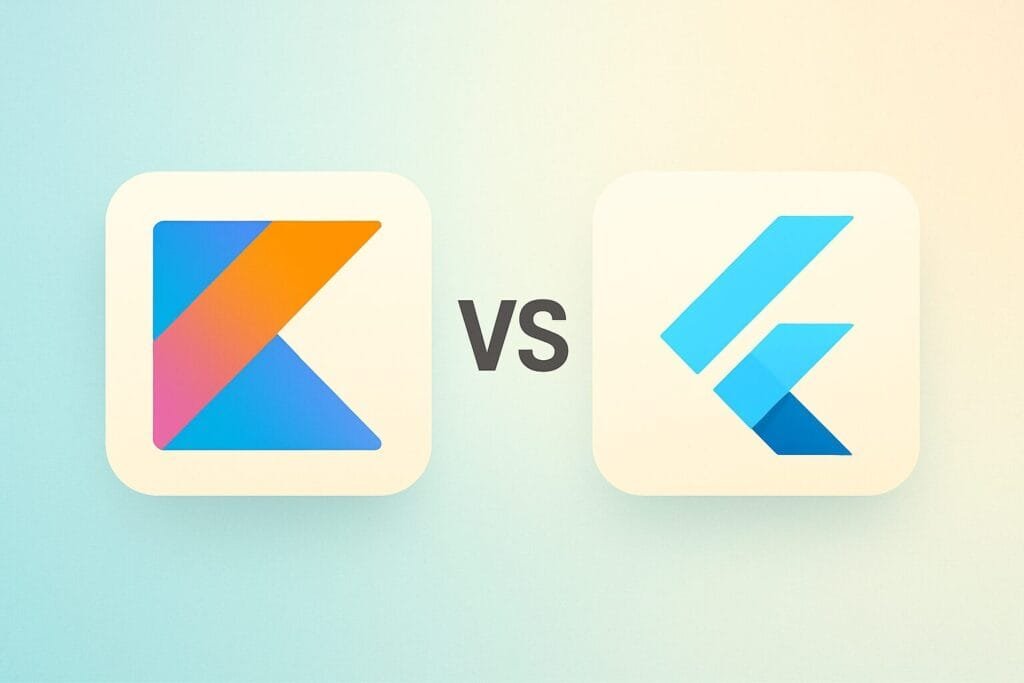As mobile development continues to evolve, many Android developers are wondering whether they should focus on Kotlin or Flutter. Both technologies are powerful and widely used, but they serve different goals and offer unique advantages. Choosing the right one depends on your project type, experience level, and long-term career goals.
In this article, we’ll explore Kotlin vs Flutter in depth, comparing their performance, ecosystem, learning curve, and job demand. By the end, you’ll have a clear understanding of which one you should learn first as an Android developer.

What is Kotlin?
Kotlin is a modern, statically typed programming language developed by JetBrains and officially supported by Google for Android development. It’s designed to be fully interoperable with Java, which means you can mix Kotlin code with existing Java codebases seamlessly.
Many Android developers prefer Kotlin because of its concise syntax, null-safety features, and powerful tools in Android Studio. It’s currently the go-to language for native Android app development.
What is Flutter?
Flutter is an open-source UI software development kit created by Google. It allows developers to build beautiful, cross-platform applications using a single codebase written in Dart. With Flutter, you can develop for Android, iOS, web, and even desktop platforms simultaneously.
The framework is known for its Hot Reload feature, customizable widgets, and near-native performance. Flutter is not limited to Android—it’s a universal toolkit for building modern mobile applications.
Kotlin vs Flutter: Key Comparison
| Feature | Kotlin | Flutter |
|---|---|---|
| Language | Kotlin (by JetBrains) | Dart (by Google) |
| Platform | Native Android (and iOS via Kotlin Multiplatform) | Cross-platform (Android, iOS, Web, Desktop) |
| Performance | Near-native (compiled directly to bytecode) | High, but slightly slower due to cross-platform rendering |
| Learning Curve | Easier for Java developers | Newer syntax and architecture to learn (Dart + Widgets) |
| UI Development | XML layouts or Jetpack Compose | Widget-based UI framework |
| Community Support | Strong, backed by Google and JetBrains | Growing fast, huge support from Google |
| App Size | Smaller (native build) | Larger (includes Flutter engine) |
| Job Opportunities | High in Android development | Increasing for cross-platform developers |
| Use Case | Best for native Android apps | Best for cross-platform mobile apps |
Performance Comparison
When it comes to performance, Kotlin applications have a slight edge because they are compiled directly into native code using the Android runtime. Flutter also offers excellent performance thanks to its Skia rendering engine, but the additional layer of abstraction can sometimes make apps slightly heavier.
Development Speed
Flutter’s Hot Reload feature significantly speeds up UI development and testing, allowing developers to see real-time updates. Kotlin, on the other hand, integrates tightly with Android Studio and supports Jetpack Compose, a modern UI toolkit that makes UI creation faster than traditional XML layouts.
Learning Curve
If you already know Java or have experience with Android Studio, learning Kotlin is straightforward. It feels natural for Android developers transitioning from Java. However, if you want to build for multiple platforms, investing time in learning Flutter and Dart might be more beneficial in the long term.
Job Market and Future Scope
In terms of career growth, Kotlin is currently the dominant choice for Android-focused roles. However, Flutter is gaining massive popularity among startups and companies looking for faster deployment across multiple platforms.
According to recent surveys on StackShare.io, Flutter ranks among the top frameworks developers want to learn in 2025, while Kotlin remains a solid foundation for any Android professional.
Which One Should You Learn?
The answer depends on your goals:
- Choose Kotlin if you want to become a professional Android developer, work on enterprise projects, or build apps that require deep integration with the Android system.
- Choose Flutter if your goal is to create visually appealing, cross-platform applications quickly and efficiently with a single codebase.
Final Thoughts
Both Kotlin and Flutter are excellent tools for mobile app development. The right choice depends on whether you prioritize native performance and stability (Kotlin) or cross-platform flexibility and speed (Flutter). Many developers even choose to learn both — starting with Kotlin for Android fundamentals and moving to Flutter for cross-platform mastery.
Ultimately, whichever path you take, mastering these tools will ensure you remain competitive and future-proof as a modern mobile developer.

